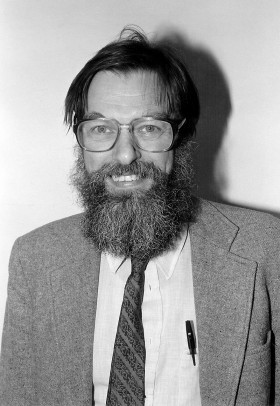Anthropologist Waud Kracke, 74

Waud Kracke applied psychoanalytic theory to his work in anthropology. Photo: UIC Photo Services (click on image to download larger size)
Waud Hocking Kracke, University of Illinois at Chicago professor of anthropology who applied psychoanalytic theory to the understanding of culture, died of cancer Dec. 31 in his Chicago home. He was 74.
A memorial service will be held March 14.
Kracke joined the UIC faculty in 1970 and continued to work at the university until just a few days before his death. A dedicated teacher, his courses focused on cultural anthropology and the application of psychoanalytic theory to the understanding of culture. He had a particular interest in cross-cultural dream analysis and in the psychology of leadership.
“His students found him an inspirational influence,” said Dylan Lott, a UIC graduate student who worked with Kracke. He was a “devoted and patient teacher,” Lott said, who “invited students to reconsider thoughts dismissed, or elements forgotten, and to give voice to dawning insight.”
In the 1960s, Kracke did field work in Brazilian Amazon basin with the Parintintin, an indigenous tribe. He continued to make periodic visits there throughout his life, working to defend the rights and culture of the Parintintin and other indigenous peoples and helped legally preserve tribal lands.
He was recently honored at the dedication of a new museum, Centro Cultural Parintintin, Traira Amazonas, to which he donated his archives of research materials on traditional indigenous beliefs and practices, including recordings of languages that are no longer spoken. Those resources are now helping young people to relearn their tribe’s language and customs.
Kracke enjoyed sharing with others elements of the cultures he had encountered, Lott said — preparing fried manioc at department pot-lucks, and lamenting the impossibility of obtaining peccary in Chicago.
Kracke sought to integrate anthropology and psychoanalysis. A graduate of the Chicago Institute for Psychoanalysis, he published a series of papers based on his fieldwork about the internal lives of people from a vastly different culture. He focused on such topics as the dreams of a frightened young boy and those of a bereaved Amazonian father.
“Waud Kracke’s extraordinary capacity to invite people to talk about their inner worlds, and his respect for what he heard, gave him access to a depth of psychology that simultaneously reflected a shared humanity and an appreciation of deep difference,” said Dr. Robert Galatzer-Levy, a psychiatrist on faculty at the Chicago Institute for Psychoanalysis. “His gentle and appreciative attitude combined psychoanalytic and anthropological investigation in a way that allowed others to share his understanding and empathy for people living in what at first appeared to be an alien world.”
Later in his life he employed the same means of respectful inquiry to understand the inner worlds of individuals living in our society who are labeled as psychotic, Galatzer-Levy said.
Kracke helped establish the Chicago Circle of the Freudian School of Quebec, an organization that introduces analysts and therapists to the approach pioneered at GIFRIC, a Quebec group working to improve treatment for young adults suffering from acute psychosis. He was also involved in efforts to open a residential treatment program in the Chicago area for young adults in the midst of acute psychotic distress.
Kracke’s honors include two Fulbright Awards, the L. Bryce Boyer Award, and election to GIFRIC, Groupe interdisciplinaire de recherché et d’intervention clinique et culturelle.
In addition to his book, “Force and Persuasion: Leadership in an Amazonian Society,” Kracke published more than 40 articles in books or refereed journals and dozens of encyclopedia articles. He produced a series of films for Encyclopedia Britannica.
Kracke was born in Beijing and grew up in Chicago’s Hyde Park. He received his B.A. from Harvard College and his Ph.D. in anthropology from the University of Chicago. He received a certificate from the Chicago Institute for Psychoanalysis for nonclinical psychoanalytic training.
Waud is survived by his wife, Lucia Minnerly Kracke; son Peter Kracke; stepchildren Robert Minnerly, Katherine Minkin, and Blake Minnerly; sister Ernesta Kraczkiewicz; two step-grandchildren and a nephew.
Donations are requested to Cultural Survival of Cambridge, Mass.; Native American Education Service College in Chicago; or the Chicago Institute for Psychoanalysis.
The March 14 memorial service will be at 10 a.m. in UIC’s Richard J. Daley Library, 801 S. Morgan St., Room 1-470. Parking is available in the Halsted Street Parking Structure at Halsted and Taylor streets.
